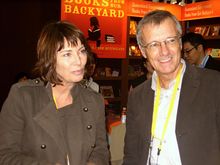Lonely Planet
Lonely Planet is a huge travel guide book creator.[3] As of 2011[update], the company had sold 120 million books since creation.[4]
| Parent company | Lonely Planet Global, Inc. |
|---|---|
| Founded | 1972 |
| Founders | Tony Wheeler Maureen Wheeler |
| Country of origin | Australia |
| Headquarters location | Franklin, Tennessee |
| Distribution |
|
| Key people |
|
| Publication types | Books Mobile apps Video Magazine |
| Nonfiction topics | Travel guides |
| Owner(s) | Red Ventures |
| No. of employees | 400 staff, 200 authors[2] |
| Official website | www |

History
changeEarly years
changeLonely Planet was created by married couple Maureen and Tony Wheeler. In 1972, they went on a trip through Europe and Asia to Australia.[5][6]
The company name originates from the misheard "lovely planet" in a song written by Matthew Moore.[7]
Tony returned to Asia to write Across Asia on the Cheap: A Complete Guide to Making the Overland Trip, created in 1975.[8]
Expansion
changeThe Lonely Planet guide book series first expanded in Asia, with the India guide book in 1981,[9] and expanded to rest of the world.[4] Geoff Crowther was noticed for frequently inserting his opinions into the text of the guides he wrote. His writing was helpful to the rise of Lonely Planet. The journalist used the word "Geoffness", in tribute to Crowther, to show a quality that has been lost in travel guides.[10]
By 1999, Lonely Planet had sold 30 million copies of its travel guides. The company's creators consequently benefited from profit-sharing and expensive events were held at the Melbourne office, at which limousines would arrive, filled with Lonely Planet workers.[4]
Wheelers' sale to BBC
changeIn 2007, the Wheelers and John Singleton sold a 75% stake in the company to BBC Worldwide, worth a guess of £63 million at the time.[10] The company was creating 500 titles and went into television production. BBC Worldwide struggled following the loss, registering a £3.2 million loss in the year to the end of March 2009. By the end of March 2010, profits of £1.9 million had been generated, as digital profits had risen 37% year-on-year over the preceding 12 months, a Lonely Planet magazine had grown and non-print profits grew from 9% in 2007 to 22%.
Lonely Planet's digital presence included 140 apps and 8.5 million unique users for lonelyplanet.com, which made the Thorn Tree travel website forum.[11] BBC Worldwide gained the remaining 25% of the company for £42.1 million (A$67.2 million) from the Wheelers.[12]
BBC's sale to NC2
changeBy 2012 BBC wanted to sell itself of the company and in March 2013 confirmed the sale of Lonely Planet to Brad Kelley's NC2 Media for US$77.8 million (£51.5 million), at nearly an £80 million (US$118.89 million) loss.[13]

COVID-19
changeIn April 2020 Lonely Planet made the decision to close its Australian and London offices and lower staffing levels globally in response to the loss in the travel industry resulting from the COVID-19 pandemic.[14] The company continued to create its guidebooks, phrasebooks, maps, children's books and inspirational picture tutorials but chose to close its magazine.
Red Ventures
changeIn December 2020, NC2 Media sold Lonely Planet to Red Ventures for an unknown amount.[15] Lonely Planet offices continue to work in Dublin, New Delhi and Beijing.
Products
changeLonely Planet's online community, the Thorn Tree,[16] was created in 1996. It is named for a Naivasha thorn tree (Acacia xanthophloea) that has been used as a message board for the city of Nairobi, Kenya since 1902.[17] The tree still exists in the Stanley Hotel, Nairobi. It is used by over 600,000 travelers to share their experiences and look for advice. Thorn Tree has many different forum categories including different countries, places to visit depending on one's interests, travel buddies, and Lonely Planet support.
In 2009, Lonely Planet began creating a monthly travel magazine called Lonely Planet Traveler. It is available in digital versions for a number of countries.[18]
Lonely Planet also had its own television creation company, which has produced series, such as Globe Trekker, Lonely Planet Six Degrees, and Lonely Planet: Roads Less Travelled.[19] Toby Amies and Asha Gill (both British TV presenters) took part in the Lonely Planet Six degrees.